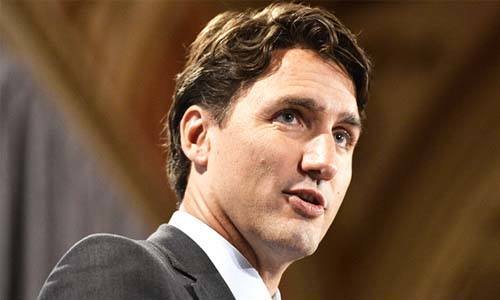
Naomi Klein: Electing Trudeau Isn’t Enough, We Need ‘Relentless Pressure From Below’

But these victories are not enough. People power can stop big, dirty projects and start small, clean ones. But for a true transition—on the scale and with the urgency that climate science demands—we need policies. Big, bold, ambitious policies that can transform our economies on a deadline. And we need them at every level of government, from municipal to national to international.
To get there, throwing out fossil fuel-addicted governments won’t be enough. Even electing progressive leaders won’t be enough. It will take a combination of electoral change and pressure (as well as vision) from below to disperse the smog of Big Carbon’s influence that shrouds our political systems.
And that means we need policies that will galvanize huge numbers of people—people who see direct benefits in advocating such transformative change. That’s the only way we will build the massive constituencies necessary to exert sufficient pressure on governments.
All of this is why, in anticipation of our recent change in government, we helped launch The Leap Manifesto in Canada. Written and endorsed by a broad spectrum of social movements—from First Nations and green groups, migrant rights and anti-poverty campaigners, big labor and small business—the Leap Manifesto is a set of policy demands that could get us off fossil fuels and shift us to an economy based on caring for the earth and each other. It’s a vision of our country that we think has mass appeal.
It calls for massive new public investments in low-carbon housing and transit, no new fossil fuel infrastructure, a shift to 100 percent renewable energy for electricity in two decades (which dozens of Canadian experts have said is entirely doable) and a totally clean economy by 2050.
In demanding that we respond to the climate crisis in a way that benefits the majority, the Leap Manifesto re-defines the whole concept of green jobs. They’re not just guys with hardhats putting up wind turbines: they’re the backbone of the entire existing low-carbon economy. Health care, education, daycare, long-term care, the arts and public interest media are all low-carbon activities that need to be re-funded and revived after decades of neglect and endless cuts.
Most importantly, the Leap Manifesto calls for justice in the way we transition off fossil fuels. In other words, the communities who had the worst deal in the extractive, polluting economy should be first in line for the clean jobs and renewed social support of the next, clean economy. That means implementing the UN Declaration on the Rights of Indigenous Peoples and respecting treaty rights. That means welcoming many more migrants and refugees to our privileged shores, acknowledging Canada’s role in the wars, trade deals and climate crisis that are collectively driving people from their lands around the world. It means a coherent policy approach that addresses multiple crises at the same time.
Granted, this is not the kind of platform that emerges from the narrow box of what mainstream politicians consider pragmatic. And that’s a good thing, because we don’t need more tweaks to a broken status quo. We need to expand what is possible, stretch our political imagination, speak to the deepest aspirations of citizens, and offer a truly inspiring vision of the kind of countries we want to live in.
And it seems that many others agree. We were stunned by the outpouring of support when the manifesto was launched. Almost thirty thousand signatures and a star-studded initial signatories list, including Canadian celebrities (people—it’s not an oxymoron!) from Leonard Cohen and Neil Young to Ellen Page and Donald Sutherland. People started asking us for Leap lawn signs. Most satisfyingly, right wing pundits went crazy. Former media baron Conrad Black wrote three columns about our modest proposal, which was also excoriated in editorials in our national newspapers—both of which went on to endorse Stephen Harper’s Conservatives, proving just how out-of-step the establishment is with the public at large.
And that was really the point. The manifesto has highlighted the inspiration gap between what is on offer in elections and the deep change so many of us know is required in the face of multiple overlapping crises. It was a clear rejection of the shortcomings of a system that encourages us to wake up, vote and go back to sleep. To wait for saviors.
So by all means, admire our new Prime Minister in his shirtless, boxing-gloved glory. We are grateful to be rid of the most destructive government in modern memory. And we will not be churlish—we’ll endeavor to enjoy our Obama Lite moment.
But we are also determined to learn from your experience. We remember what happened when progressives de-mobilized after Obama was elected and we won’t make the same mistake. Instead, a huge and growing movement of Canadians is determined to give our young prime minister the best gift any new government can receive: relentless pressure from below.
Why Donald Trump and Bernie Sanders Are Rock Stars Among the Working Class
Bernie Sanders Demands DOJ Go After Exxon for ‘Covering Up’ Climate Change
4 Justin Trudeau Campaign Promises That Could Make Canada a Green Powerhouse
David Suzuki: ‘Democracy Is as Strong as the People Who Make Its Values Come Alive’

 233k
233k  41k
41k  Subscribe
Subscribe 